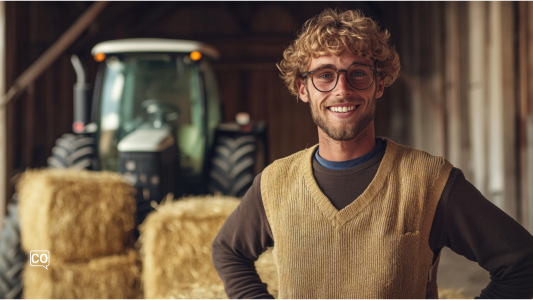Spanish A2.9.2 The Happy Animals on Luis's Farm Share Copied!
Luis looks after the animals on his farm. Learn about the cow, the pig, the rooster and much more through this story.
Cuento corto: Los animales felices de la granja de Luis
Luis cuida a los animales de su granja. Aprende sobre la vaca, el cerdo, el gallo y mucho más a través de esta cuento.

A2 Spanish
Level: A2
Module 2: Naturaleza y medio ambiente (Nature and environment)
Lesson 9: Visita el campo (Visit the countryside)
Teaching guidelines +/- 15 minutes
Audio and video
Text and translation
| 1. | Luis trabaja en su granja todos los días. | Luis works on his farm every day. |
| 2. | Él alimenta a las vacas por la mañana. | He feeds the cows in the morning. |
| 3. | Después visita al cerdo porque está enfermo. | Then he visits the pig because it is ill. |
| 4. | El toro pasea por el campo cerca de la granja. | The bull walks through the field near the farm. |
| 5. | La cabra y la oveja están comiendo juntas porque comen lo mismo. | The goat and the sheep are eating together because they eat the same thing. |
| 6. | Luis no sabe por qué los caballos no quieren su comida. | Luis does not know why the horses do not want his food. |
| 7. | Más tarde va a cuidar a las gallinas y al gallo. | Later he is going to take care of the hens and the rooster. |
| 8. | Los patos también esperan su comida porque tienen hambre. | The ducks also wait for their food because they are hungry. |
| 9. | Luis cuida bien de todos los animales de su granja. | Luis takes good care of all the animals on his farm. |
Exercise 1: Discussion questions
Instruction: Discuss the questions after listening to the audio or reading through the text.
- ¿Qué animal alimenta Luis primero por la mañana?
- ¿Qué hacen la cabra y la oveja?
- ¿Por qué visita Luis al cerdo?
- ¿Cuál es tu animal de granja preferido y por qué?
Exercise 2:
Instruction: Fill in the correct word.
cerdo, alimenta, granja, cabra, campo, caballos
